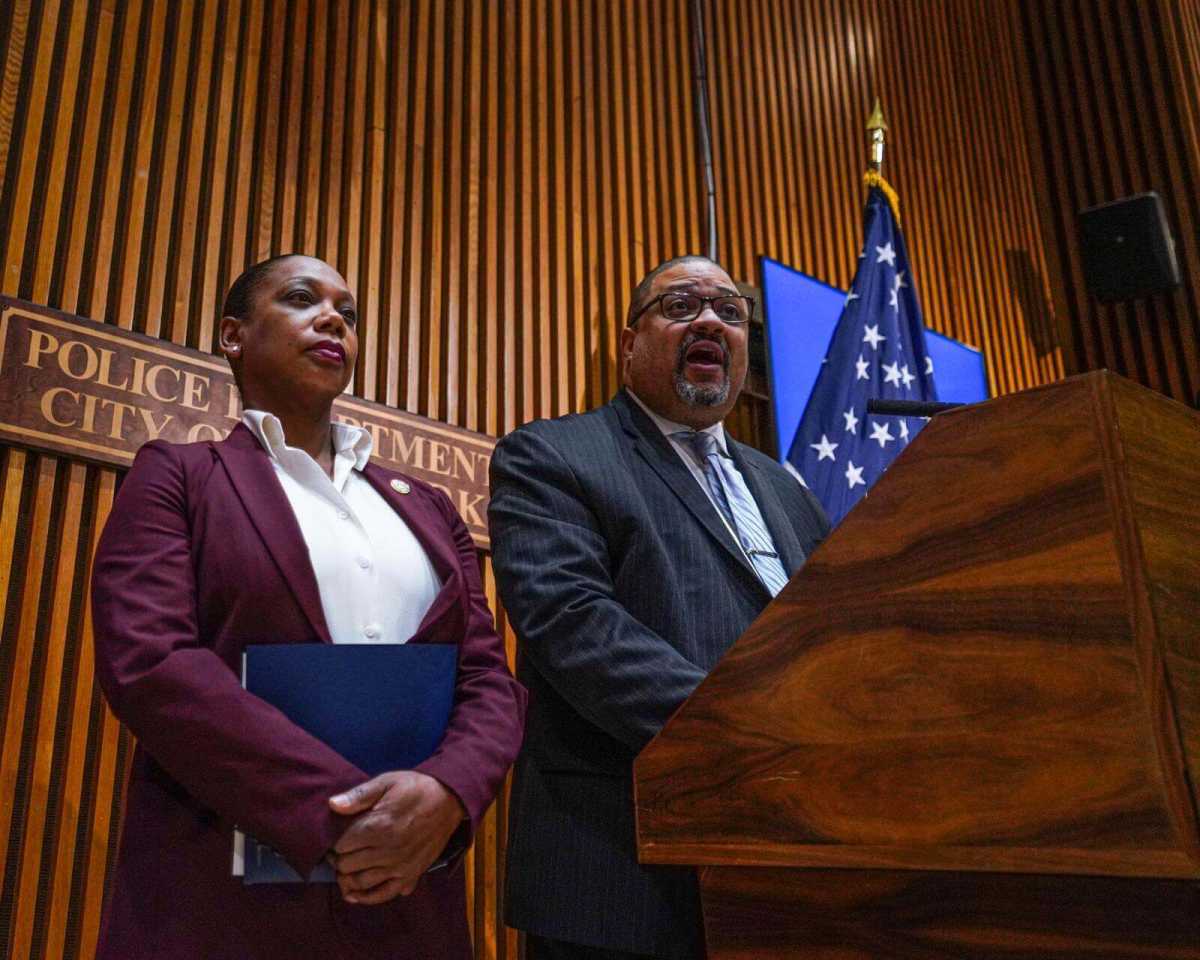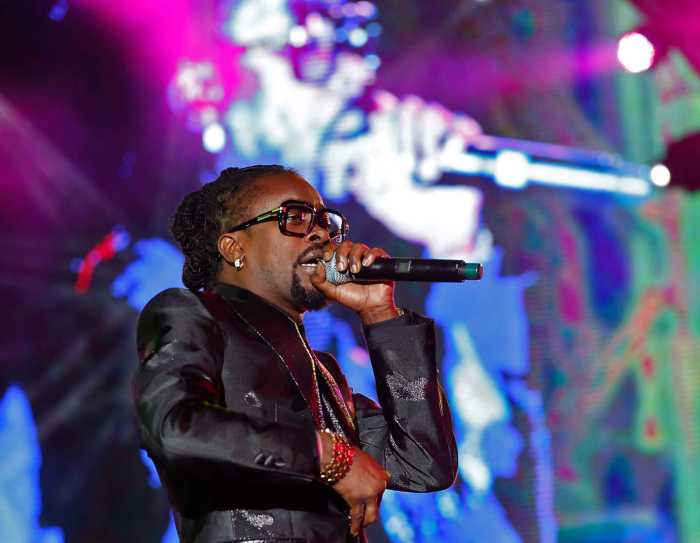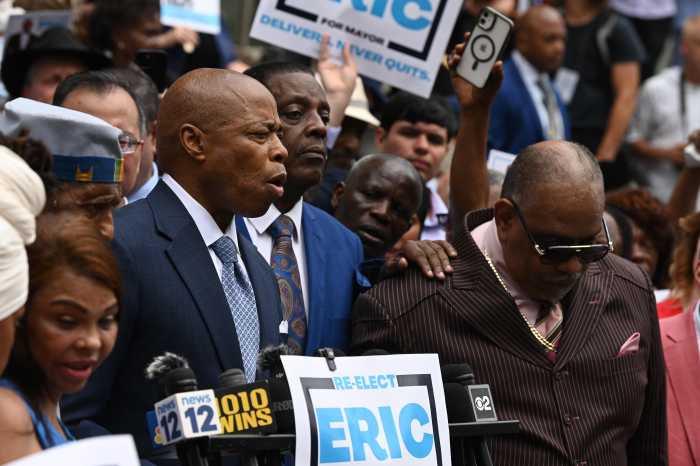The last suspect in the gang rings that left two gay men dead and put New York City’s nightlife on edge since November was arraigned yesterday.
Jaykwan Hamilton, 35, was charged with the homicides of gay men Julio Ramirez, 25, a social worker, and John Umberger, 33, a political consultant, at his arraignment late April 18. Hamilton was also charged with robbery, identity theft, grand larceny, and conspiracy.
Linda Clary, Umberger’s mother, told Gay City News that Hamilton was remanded in custody. Hamilton’s attorney requested a bond hearing and a review of the indictment. The next court date is set for June 8.
Jacob Barroso, 30, and Robert Demaio, 34, were also charged along with Hamilton with the murder of Ramirez. Hamilton and Demaio were charged with the murder of Umberger.
Bragg and Essig said two other unidentified defendants along with Barroso, Demaio, and Hamilton were charged with murder in the second degree on various counts of robbery, grand larceny, identity theft, and two counts of conspiracy.
A sixth defendant, Eddie Ashley, 29, was previously indicted in relation to one of the robbery incidents.
New York City Police Commissioner Keechant Sewell and other city leaders announced the charges against and arraignment of Hamilton and the four other defendants along with Ashley’s connection during a news conference at police headquarters April 18. Sewell was joined at the news conference by Chief of Detectives James Essig, Manhattan District Attorney Alvin Bragg, Assistant District Attorney Emily Ching, and New York City Mayor Eric Adams.
Investigation & indictments
Responding to reporters’ questions about the length of the investigation and the suspects’ arrests and indictments, Adams and Sewell called the investigation “complex”
“It is not lost on us there was a lot of concern because some of the victims in this case were members of the LGBTQ plus community,” Adams said.
Adams thanked officials, including the city’s hate crimes unit and task force, and New York’s LGBTQ nightlife community for working together to protect the community.
“We want to send a message to our LGBT community that we understood the trauma that you experienced during this time,” he said.
Bragg also noted that Adams increased the district attorney’s Hate Crimes Unit budget to $1.7 million, which allowed the office to hire three additional assistant district attorneys, increasing the legal staff to 20 total.
Bragg said no evidence of hate crimes surfaced in the investigation of the drugging and robbery rings.
Adams said the crimes perpetrated by the suspects were “clearly rooted in greed [with] total disregard for the victims.”
“The investigation allows us to bring dangerous people off the streets,” he continued.
Bragg said, “We still stand with the community and continue to meet and address their concerns.”
Adams, Bragg, and other city officials expressed their condolences to the victims’ families. They also addressed the fears that community leaders, especially in New York’s LGBTQ community, experienced during the five-month investigation once the connection was made between Ramirez and Umberger’s deaths.
“I am relieved and grateful for the hard work and commitment of NYPD Detective Randy Rose and the many others at NYPD who worked so hard to make the arrest of Jaykwan Hamilton possible,” Clary, who flew to New York from Atlanta early April 18 for Hamilton’s arraignment, wrote in a statement to the media.
Clary pushed New York detectives to find out what happened to her son, Umberger, and the cases were connected last November.
“Although these arrests will not bring back Julio and John, they are a step towards justice for their families and loved ones,” said District 3’s out gay councilmember, Erik Bottcher, whose office covers Greenwich Village, Chelsea, Hell’s Kitchen, and other neighborhoods on the west side of Manhattan. “I send my deepest sympathies to families and loved ones of Julio and John. Let us honor their memory by working towards a safer and more equitable society for all.”
Bragg, Essig, and Sewell described how the suspects carried out the crimes by approaching the victims inside or near the venue as they were leaving late at night and offering them drugs. Once the victims were incapacitated, the suspects used the facial recognition feature on their smartphones to access their bank accounts and transfer money using various apps to their personal accounts. They also used their credit cards to make purchases in the hours and days after the incident.
The suspects drained Ramirez and Umberger’s bank accounts of an estimated $20,000 each and ran up their credit cards.
In some incidents, the suspects returned to the crime scenes.
“We know there were roommates who were also victims when they went back, where property was taken from the apartment,” Essig said. “We don’t know what community [the victims] belong to, but many if not most of the men that were confronted were members of the LGBTQ community.”
Police were able to connect the suspects to Ramirez and Umberger by creating timelines using security videos at businesses and residences, credit card purchases, electronic transfers, and other sources. One of the pieces of evidence in the case includes videos obtained by warrant on Demaio’s cellphone that showed Demaio and Hamilton in one of the victim’s apartments with the individual apparently unconscious in the same pose that police found the victim dead, Essig said.
Essig said three of the five suspects had police records. Hamilton had 12 prior arrests. Barroso had nine prior arrests. Demaio had four prior arrests.
Some media reports described Hamilton as the “ringleader” of the gang, but Essig declined to call Hamilton as such.
“I wouldn’t say there’s a ringleader,” said Essig, who explained that most of them lived on Front Street in Brooklyn and one of the suspects lived at Adam Clayton Powell Jr. Boulevard in Manhattan. “They all know each other. They’re from Brooklyn. We think they’re friends from Brooklyn.”
On March 23, the grand jury issued a true bill indicting the suspects, Essig said.
“The defendants had no regard for whether the victims ever recovered from being drugs,” Bragg said.
In December 2022, Bragg announced the arrest and indictment of Kenwood Allen, 33, in relation to the ring of gangs drugging and robbing victims — LGBTQ and straight — in New York’s nightclubs. Allen was charged with two counts of second-degree murder, three counts of first-degree robbery, two counts of third-degree criminal possession of a controlled substance, one count of second-degree robbery, and two counts of second-degree assault for causing fatal overdoses of two people Allen robbed on the Lower East Side.
The medical examiner on March 24 also discovered a similar lethal cocktail in her autopsy of Kathryn “Katie” Gallagher, a New York fashion designer and celebrity stylist for Lady Gaga, Laverne Cox, and Chrissy Teigen. Gallagher, whose death was declared a homicide, was found dead in her Lower East Side apartment July 23, 2022. It’s unclear if Gallagher identified as LGBTQ or if her death and the deaths of seven others, including Umberger and Ramirez, are related.
Essig said police are investigating her murder.
ABC News reported Nurbu Sherpa, 29, and Ardijan Berisha, 26, are two other fatal drugging victims. Shera was found in front of an East Village building in March 2022. Berisha was found in front of a Lower East Side building in July 2022. It’s unclear if these victims identified as LGBTQ.
In January, Jordan Taylor, a 29-year-old NYC law student, went missing outside of The Q. He hasn’t been found. It’s unclear if Taylor is possibly another victim or identifies as LGBTQ.
Essig added that similar homicides, one in September 2022 and two others in December last year, were also being investigated. Detectives investigated 17 similar incidents occurring between September 19, 2021, and August 28, 2022, he said.
At least 43 druggings, with 7 fatal overdoses, have been linked to two separate patterns of robberies dating back to September 2021, reported ABC7 NY News.
New York City Medical Examiner declared Ramirez and Umberger’s deaths homicides with “drug-facilitated thefts” March 3. The medical examiner found “acute intoxication” with the combined effects of nearly the same lethal cocktail of “fentanyl, p-fluorofentanyl, cocaine, lidocaine, and ethanol” in the bodies of Ramirez and Umberger. Heroin was also found in Ramirez’s system.
The NYPD publicly released arrest warrants with the mugshots for Barroso, Demaio, and Hamilton March 31. Police arrested Barroso and charged him with murder along with nearly a dozen other counts in connection with Ramirez and Umberger’s deaths April 1. Demaio turned himself in on April 3. Hamilton remained at large until April 17.
Members of the NYPD Violent Felony Squad arrested Hamilton in Manhattan’s Chelsea neighborhood without incident on April 17. Hamilton is the third and final suspect in the 2022 New York City nightclub drugging and robbery rings that left seven dead, including Ramirez and Umberger.
The suspects are now going to trial, Adams said.
A safer city
“It is my hope that everyone in NYC is at least a little safer, especially the LGBT community,” Clary wrote.
“Nobody should have to worry about their safety and well-being when enjoying Manhattan’s vibrant nightlife,” Bragg said. “This investigation sends a clear message that we have no tolerance for this type of dangerous and deadly conduct.”
Clary expressed her relief and resolve for justice for her son and other victims’ families turning her attention to the trial ahead.
Bragg encouraged the public and victims of similar crimes to come forward and report incidents by calling the district attorney’s helpline at 212-335-9040.
































